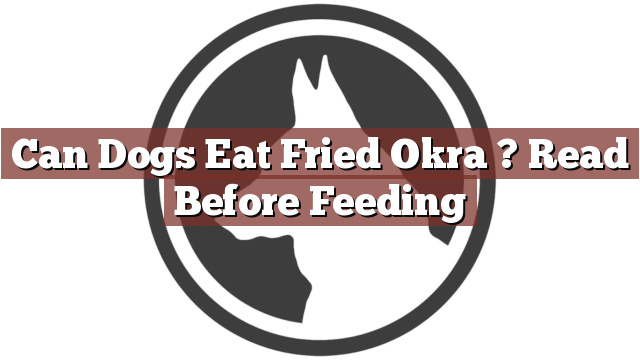Understanding Your Dog’s Dietary Needs
As responsible pet owners, it is crucial to understand our furry friends’ dietary needs. While dogs are omnivores, meaning they can eat both meat and plant-based foods, not all human foods are safe for them. A balanced diet for dogs typically consists of high-quality dog food, which provides the necessary nutrients they need to thrive. However, it is natural for dog owners to wonder if they can share certain human foods with their pets, such as fried okra.
Can Dogs Eat Fried Okra? Read Before Feeding
Can dogs eat fried okra? No, it is not recommended to feed your dog fried okra. While plain okra is considered safe for dogs to eat in moderation, the frying process introduces potential hazards. Fried okra is usually coated with a batter and then deep-fried, making it high in fat and calories. This can lead to unwanted weight gain, obesity, and related health issues in dogs. Additionally, the batter used in fried okra often contains ingredients like wheat flour, cornmeal, or breadcrumbs, which may not be suitable for all dogs, especially those with allergies or sensitivities.
Pros and Cons of Feeding Fried Okra to Dogs
Feeding your dog fried okra can have both pros and cons, but the cons generally outweigh the benefits. The pros of feeding fried okra to dogs include the fact that okra is a good source of vitamins A and C, as well as dietary fiber. These nutrients can contribute to your dog’s overall health and well-being. However, the cons are more significant. The high fat and calorie content in fried okra can lead to weight gain and obesity, which can increase the risk of various health problems, including diabetes, heart disease, and joint issues. Additionally, the ingredients used in the batter and frying process may not be suitable for all dogs, causing digestive upset or allergic reactions.
Conclusion: Make an Informed Decision for Your Dog’s Health
While fried okra may be a tasty treat for humans, it is best to avoid feeding it to your furry companion. No, dogs cannot eat fried okra without potential risks to their health. Instead, ensure your dog’s diet consists of nutritionally balanced dog food that meets their specific dietary needs. If you want to share a vegetable with your dog, consider offering them plain, cooked okra as an occasional treat. However, always consult with your veterinarian before introducing any new food into your dog’s diet to ensure their safety and well-being. By making informed decisions about your dog’s diet, you can help them live a long, healthy, and happy life.
Thank you for taking the time to read through our exploration of [page_title]. As every dog lover knows, our furry friends have unique dietary needs and responses, often varying from one canine to another. This is why it's paramount to approach any changes in their diet with caution and knowledge.
Before introducing any new treats or making alterations to your dog's diet based on our insights, it's crucial to consult with a veterinarian about [page_title]. Their expertise ensures that the choices you make are well-suited to your particular pet's health and well-being.
Even seemingly harmless foods can sometimes lead to allergic reactions or digestive issues, which is why monitoring your dog after introducing any new food item is essential.
The content provided here on [page_title] is crafted with care, thorough research, and a genuine love for dogs. Nevertheless, it serves as a general guideline and should not be considered a substitute for professional veterinary advice.
Always prioritize the expert insights of your veterinarian, and remember that the health and happiness of your furry companion come first.
May your journey with your pet continue to be filled with joy, love, and safe culinary adventures. Happy reading, and even happier snacking for your canine friend!

